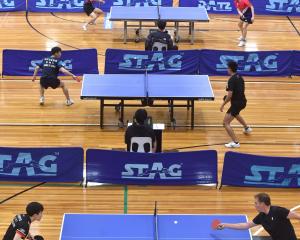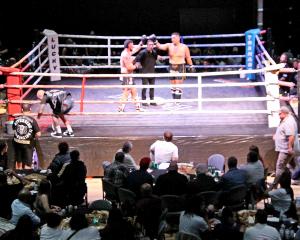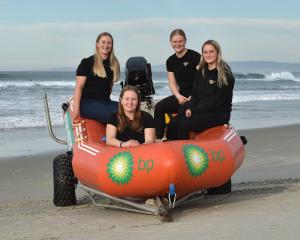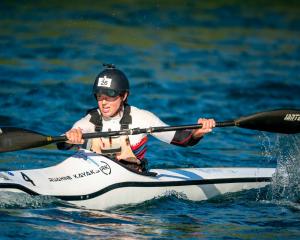Sports reporters are used to asking the questions - but sometimes the spotlight needs to fall on them. In the first of what will (hopefully) be an annual series, sports editor Hayden Meikle fires some questions at Otago Daily Times sports reporter Adrian Seconi, New Zealand Herald netball and yachting writer Dana Johannsen, and Herald columnist Chris Rattue. The reporters were free to pass on any question.
Adrian Seconi: It really just comes down to the individual.
Chris Rattue: I have very little direct contact with competitors from the major sports these days - those I do deal with are often from sports where there is not a lot of media scrutiny. There was a lot more direct contact, and in informal situations, between journalists and All Blacks for example, many years ago. These days, most of the contact is stage-managed. My guess is that the media has far less idea these days what top sportspeople in this country really feel about anything.
Dana Johannsen: I have to say I'm lucky with the rounds I cover in that the athletes, coaches and administrators are (mostly) all open, engaging and happy to make time for media, and I haven't seen any shift in this over time. If I were to zero in on netball, since the move to professionalism in 2008 there has been a growing acceptance that if they want to be a high-profile sport, it means there will be criticism from time to time. It is good to see netball has now matured to a point where they see debate as healthy.
Seconi: As long as we are obsessed with winning medals, this type of performance-related funding makes sense. The bigger picture is about getting children off the couch and active again. That would require a completely different funding model.
Rattue: My brain hurts ... is there a near-perfect answer? I do love what track cycling has done - it has developed a world-class programme with results to match in a sport heavy on science. Anything that stops rugby swamping this country is good. As for the funds distribution - wouldn't know.
Johannsen: While I feel for the sports that miss out, HPSNZ's targeted approach is proven to be the best model when there are only limited funds to go around. I do, however, think the system is too inflexible when you've got situations occurring like with Marina Erakovic. New Zealand's top-ranked player, a regular on the WTA Tour, is unable to even access the gym facilities at the Millennium Institute as she is not a carded athlete, and yet you have (very) fringe Silver Ferns that are able to get access to all of HPSNZ's sports science resources.
Seconi: Personally, I won't miss the golf, but I do hope the product that replaces it is something which involves a few New Zealanders. I'd love to see events like the National Basketball League or the National Hockey League get some love from Sky. They are our stories and they are what interests me.
Rattue: In reality, probably not, especially cost-wise. It can make it more expensive for people (like me) who like to watch a variety of things. For single-sport people, it could work. But the internet quality is still dodgy for many people, especially if they do not have the fastest service. As a personal test case, I am now watching far less English Premier League football since the rights were won by an internet service over Sky. I paid for the EPL pass the first year, but not the current season, and rely on watching the handful of individual club channels available here and the one live free-to-air game. Yet I think the service Coliseum provides is actually very good, so long as there are no technical hitches. There comes a time, expense wise, when you say enough is enough. Broadcasting is moving so rapidly - who knows where it will end up? Streaming will allow people to watch ''niche'' sports and sporting events, which is great. Viewing habits will change, away from sitting down and watching entire games and towards highlight-style packages with a lot of mobile device use.
Johannsen: From a purely selfish point of view, I don't find it a good thing. As a Sky subscriber, I enjoy the ease of a one-stop shop for all my sporting viewing. It wouldn't be such a problem if Sky was losing out to mainstream free-to-air channels, but as it is generally other pay-per-view operations picking up the rights, it just means more expense.
Meikle: The haka - overdone?
Rattue: Absolutely. I turn off the sound and make a cup of tea when it is being performed by the All Blacks. Its overuse misrepresents New Zealand society on one level, suggesting a cultural tolerance and harmony which is not as genuine as it should be, but accurately reflects the way corporations dominate our life and can use anything and everything to promote their products. It is also a classic piece of tokenism - Maori values are treated as a separate entity to be patted on the head rather than becoming integral to our way of life. How many Maori (or Pacific Island) people are on the NZRU board, for instance?
Johannsen: Can't say it bothers me.
Meikle: Do you have any thoughts on the rise of sports betting and the TAB's prominence in things like rugby broadcasts?
Seconi: The All Black brand, in my opinion, is being used to help normalise gambling and capture a new market demographic. Gambling does real damage in the community and I would like to see some of our marquee teams and leading athletes take a stand on the issue, much like some do with anti-smoking campaigns.
Rattue: Not really ... apart from the ''please gamble responsibly'' line, which is as genuine as a three-dollar note. It's like the signs in pubs which claim that drunk people won't be served. The gambling industry is built on people gambling ''irresponsibly'' and likewise, the booze industry thrives on people getting drunk.
Johannsen: I find it worrying. I would hate to see New Zealand coverage go down the path of Australian broadcasts where every couple of minutes there is some greaseball popping up on the screen to deliver the latest odds before adding a pithy, ''And remember, please gamble responsibly''.
Meikle: Should we keep pouring money into America's Cup challenges?
Seconi: No. And for many, many different reasons. But mainly because without a change in leadership, the same results just seem likely.
Rattue: No. Leave it to private enterprise.
Johannsen: Taking all the emotive arguments out of it, it doesn't really make any difference to the Government coffers whether they do or don't invest in Team NZ. The $36 million the Government contributed to the last campaign ended up being returned to them over the three-year period through income tax paid by Team New Zealand employees and GST from the money they spent building and developing their boats in New Zealand. Without even accounting for the extra jobs and economic boost it provides the local marine industry, it is a tax-neutral investment.
Meikle: Too much rugby?
Seconi: ... and not enough variety.
Rattue: It is what it is - turn it off and do something else if you don't like it. The important thing, as a society, is to keep alternatives alive, even if they don't get major media coverage. Sports do have ways now of promoting themselves, and getting good editorial out there, even if the mainstream media ignores them. That is one of the great things about the internet. We have amazing coverage of world sport in this country.
Johannsen: It does tend to get a bit overblown during an All Black series. But as with anything, if you're not interested you can just crouch, touch, pause and disengage.
Meikle: Match-fixing and doping - on the rise, or not really much of a problem in little old New Zealand?
Seconi: Don't be naive. Cheats are everywhere. Border seizures in New Zealand were at record levels in 2013. And all manner of substances - some good, some bad - are available online. The supplement industry is a largely unregulated behemoth gobbling up the gullible and spitting out the tainted residue. I'm not completely convinced our testing regime is particularly robust or very well resourced, either. And as for match-fixing, well, is Chris Cairns our very own Lance Armstrong?
Rattue: Vigilance is essential, everywhere.
Johannsen: We'd be incredibly naive, particularly in light of recent events, to think these types of integrity issues aren't a challenge here.
Meikle: What do you make of the rise of social media, and has it greatly affected your role?
Seconi: I try to avoid social websites because I still believe in old-fashioned values like balance and fairness.
Rattue: I'm not a social media user. It has not directly affected my role in any major way, although it has for others around me.
Johannsen: The rise of social media has presented both opportunities and challenges for sporting bodies and athletes alike. It has provided a platform for sports to promote themselves and their events. Another positive is, in an age where press events are tightly managed by media minders, social media allows athletes to show a bit more personality. But there are countless examples of New Zealand and international sports stars getting it horribly wrong when it comes to their social media interactions, whether it be making racist, sexist or other controversial comments or just sharing naked pictures of yourself, as one does. I wouldn't say social media has greatly affected my role, but it has provided plenty of column fodder when athletes or organisations have got it wrong.
Meikle: Should we (the print media) cover more women's sport?
Seconi: The short answer is yes. The long answer is only when interest warrants it. But it seems to me some male-dominated sports like cricket enjoy privileged coverage when that interest is just not that obvious. The Volts, for example, often play in front of deserted embankments but still get a lot of column space the next morning.
Rattue: Yes, if only slightly more. The increasing dominance of rugby in a ratings-driven media has had many effects. There may actually have been more coverage of women's sport in the past, when we had great runners and a strong softball team, for example. Lydia Ko and Valerie Adams are carrying the torch.
Johannsen: Yes. While some may claim no-one is interested in women's sport, there is nothing especially interesting about five days of speculation over whether an injured All Black will play the following weekend, either. There are plenty of interesting stories in women's sport if journalists go looking for them - it's just that most don't.
Meikle: Are we pouring too much money into elite sport at the expense of the grass roots?
Seconi: Yes. The core value of sport in any community is its ability to promote health and wellbeing and foster social ties.
Rattue: It depends what you determine ranks as grass roots. Club sport is all about volunteers and passion. That's the way it is meant to be and how it works best.
Johannsen: Hard to say, as every sporting body has a different philosophy on where they choose to spend their money. But at a Government level now that Sparc has been split into two separate entities - Sport NZ and High Performance Sport NZ - the grass-roots end of sport is no longer in competition for cash with the elite end, so there seems to be a much happier balance.
Meikle: Is Lydia Ko or Steven Adams the most exciting prospect in New Zealand sport?
Seconi: Adams. But only because golf is sooooo boring.
Rattue: Depends on what they achieve.
Johannsen: Too hard to split them. They are both really choice.
Meikle: Name a New Zealand athlete who needs more attention from the media, and explain why.
Seconi: Dual cricket and basketball international Suzie Bates is one of the best batsmen in the world. But outside of Dunedin - her home city - how well is she known?
Rattue: To twist that question a bit . . . I often feel that a wide range of motor racing competitors who are doing amazing things around the world are not given coverage to match. It is a bit difficult for the media, because there are so many different categories.
Johannsen: It's pretty difficult to single out one athlete that is achieving great things. But I would say it's a shame we don't hear more about our Olympic athletes in between Olympic years - unless they are Val Adams or our world champion rowers, they tend to drop off the radar a bit.
Meikle: Name a New Zealand athlete who needs less attention from the media, and explain why.
Seconi: Jesse Ryder has had more chances than any other New Zealand cricketer I can think of. He continues to blame everyone else, particularly the media, for his troubles. I am over it, and so are the Black Caps.
Rattue: I wouldn't want to take away anyone's limelight. It's a tough sporting world out there.
Johannsen: Sonny Bill Williams. I'm actually an ESS-BEE-DUB fan, but I just think he needs a break.
Meikle: There are three major World Cups for New Zealand teams next year. Where will the Silver Ferns, the Black Caps and the All Blacks finish?
Seconi: The Silver Ferns are good for second. The Black Caps have a semifinal appearance in them, and the All Blacks will start as favourites.
Rattue: Too early to make predictions that I don't want to be held to . .. BUT our netballers have fallen behind Australia, the All Blacks need to refresh their backline, and we punch above our weight in cricket, especially in producing players suited to the short-form game.
Johannsen: You'd have to say at this point the Australian Diamonds are the overwhelming favourites for the netball World Cup, and it is difficult to see the Silver Ferns being able to make up the amount of ground they need to in the next 10 months. The Black Caps have the ability to make the semis. The All Blacks will win the World Cup. I should probably add the caveat here that I have said that ahead of every other RWC and have been right once (I wasn't paying much attention back in 1987).












